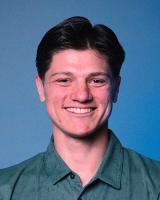Next man up: how Camelback football is changing team culture
October 23, 2024 by Nate Mills, Arizona State University

Nate Mills is an ASU Cronkite School of Journalism student assigned to cover Camelback High School for AZPreps365.com
Pads crash and teammates are talking trash during a practice at dusk on Camelback’s football field. The lights are late to turn on and it’s hard to see the ball, but the players are still expected to go full speed.
The Spartans (3-4, 2-0) are coming off a bye week and are now preparing to play against North (1-6, 1-1). While Camelback’s record may not show it, this team has come a long way.
Though they’ve gotten off to a slow start, Dante Foster has the chance to bring Camelback their sixth consecutive winning season in his first year as head coach.
But, Foster’s goals go beyond on-field production. From the time he first set foot on campus, Foster implemented the “30-60-90” method to build community and change culture.
His first 30 days at the helm, he built bonds with the administration, teachers and players on campus. The next 60 days were spent changing day-to-day operations with the team on and off the field.
“That started with our shoes. (Closed-toed) shoes instead of crocs, you know, (not wearing) PJs,” Foster said. “Everybody runs for it. So, we started with the small things.”
In the 90-day period, Foster strives to build a relationship between the team and local community. To nurture these bonds, Foster makes sure his players are leaders in their community by exhibiting good behavior and in the classroom with a high grade point average.
“When I got on campus,” Foster said, “there was so much negativity around our players and our kids and their grades and their behavior on campus and it's been a change. I mean, we don't have any kids with bad grades all year. There hasn't been anybody in trouble. I think that it's been a really big uplift. And I think that our teachers, our community can truly build on that.”
Jamar Pinnock is a returning linebackers coach with Camelback. As someone who was a part of the team before Foster’s arrival, he can attest to this change.
“We had an issue earlier on, guys were under red or the yellow,” Pinnock said. “The warning red means you're failing. Coach has done a tremendous job making sure they're passing their classes and just setting standards. I don't feel like there was a standard on certain things. Now, there are definitely standards, for sure.”
Spearheading Camelback’s cultural renaissance, Foster also has to construct a lineup that puts 11 competitors on offense and 11 competitors on defense. That leaves only nine backups in this 31-man roster.
Foster’s emphasis on culture is echoed by his coaching staff, including Pinnock, who has fully embraced the new mindset. Pinnock credits this shift in mentality for the team’s renewed focus and determination.
“The expectation is to compete,” Pinnock said. “We talked about the five P’s: prior preparation prevents poor performance. Control what you can, and doing your assignment before worrying about somebody else's job. So those little things, I think, eventually accumulate to winning over time for sure.”
Their small team size leaves an air-tight margin of error when players are ineligible to take the field due to injury or ineligibility.
But with Camelback’s newfound mentality, the Spartans can fill in potential vacancies in the roster with players throughout the entire program.
“We always go by ‘next man up,’” senior captain Da'jieon Carter said. “You see those JV guys, they've been playing hard coming up. For example, there’s a JV guy named G'ontaye (Williams). He's a running back. He comes in and runs the ball hard. He making us run gassers.”
With more than half of the regular season completed, Camelback hopes to keep their same energy and finish strong in regional play.
“At the end of the season, that's typically when the battle of attrition kind of kicks in,” Pinnock said. “We have a lot of young guys that we're going to trust to put in, and I'm pretty confident about that, but we just got to play complementary football to help us out.”
